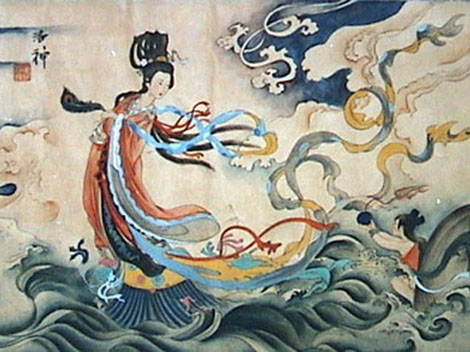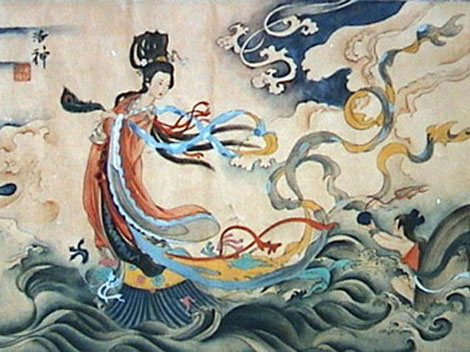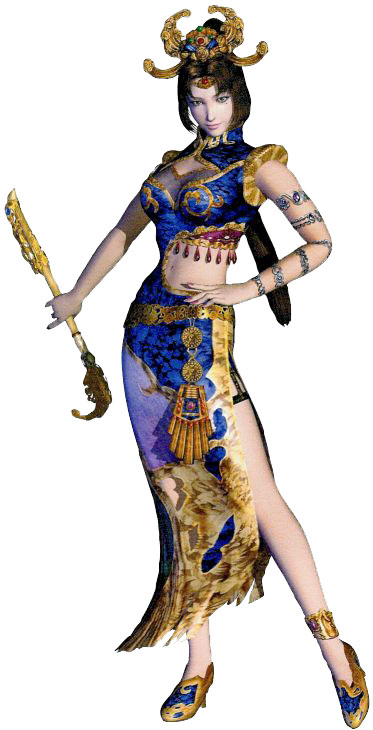Sometimes when researching history, you come across someone who is entirely unimportant in the grand scheme of things but didn’t half lead an interesting life. Lady Zhen is one such person. She occupies a role in history so brief and unassuming that we don’t even know her name. She lived between 183 and 221 AD in China, becoming the wife of Cao Pi, the first emperor of the Cao Wei dynasty. She was the mother of his successor, Cao Rui, and as far as history goes that’s where her story begins and ends. Like so many women, her life is known by the men within it. Her actual life however, was incredibly dramatic even during one of the most romanticised periods of history.
In fiction, Lady Zhen features in many video games produced by Koei, most notably as a playable character in a number of instalments in the Dynasty Warriors series. In the absence of knowing her personal name, Lady Zhen is dubbed Zhen Ji, literally: ‘consort’ Zhen. Much is made of her appearance (historically she was a renowned beauty) and she appears as somewhat arrogant, quite feisty, but above all utterly devoted to her husband Cao Pi. She is often shown to abandon her first husband, Yuan Xi, after a brief flirtation with Cao Pi, and the realisation that the latter is about to win in a significant battle. Apart from these appearances in a video game series, she features very little in fiction. There have been no novels written of her life, though she does appear twice on television. Recently she features in the serial Where the Legend Begins (2002) and earlier in the series God of the River Lok (1975). In the latter she is named Zhen Fu, with the series focusing on her fictional affair with her second husband’s brother. The story presents a beautiful, neglected wife and a hopelessly romantic brother falling in love behind the back of the emotionally cold Emperor.
But Lady Zhen’s history is infinitely more dramatic than a beautiful woman in an imaginary love triangle. Historically, her story becomes dramatic where it seems to start in fiction; with her marriage to her second husband Cao Pi. After her first husband is defeated at the battle of Guan Du by her soon to be father in law, Cao Cao, she is given as a gift to his eldest son; Cao Pi. Interestingly, eight months later she gave birth to their first son, a son whom Cao Pi freely acknowledged as his own, rather than the child of Lady Zhen’s first husband, so much so that he made the child his heir.
From the historical records of Wei’s rival kingdoms we know that Lady Zhen was widely respected for her kindness. Apparently she was a most dutiful daughter, especially to her mother in law and was praised for her tolerance of Cao Pi’s concubines.
Enter: Guo Nuwang, one of Cao Pi’s favourite concubines. She was favoured far above Lady Zhen and used her influence to drive a wedge between the couple. When Lady Zhen complained to her husband about Nuwang’s doings, Nuwang encouraged Cao Pi to think of Lady Zhen as a scold and a nag. This continued for many years, coming to a head when Cao Pi moved to his newly acquired palace at Luoyang, taking Guo Nuwang with him, but not Lady Zhen. We do not know how Lady Zhen reacted to not being summoned. What we do know is that Guo Nuwang told Cao Pi that she took it badly; ranting and raving until Cao Pi, by now thoroughly tired of his wife’s supposed negative attitude, sent envoys to her, forcing her to commit suicide. After Lady Zhen had done so, Guo Nuwang gave orders that Lady Zhen’s hair cover her face and her mouth be filled with rice shells, cursing her with blindness and leaving her mute in the afterlife.

How much more dramatic can a love triangle get? What could be more sensational than the man in the middle, not only choosing between two women, but forcing one of them to commit suicide? I am very, very surprised that more is not made of Lady Zhen and Guo Nuwang’s rivalry in fiction. But then, in a period absolutely full of colourful characters surrounded by myth and legend, it stands to reason that even the more interesting stories would fall in the shadow of the most fantastical tales.
After the death of Lady Zhen, Cao Pi made Guo Nuwang his empress. When he died, one of the other concubines who had conspired against Lady Zhen, informed the new emperor what Nuwang had done to his mother, Lady Zhen. The Emperor was apparently unfazed and treated his step mother with all due honours as dowager empress. Then he had envoys sent to her, forcing her to commit suicide, before covering her face with her hair and filling her mouth with rice shells.














